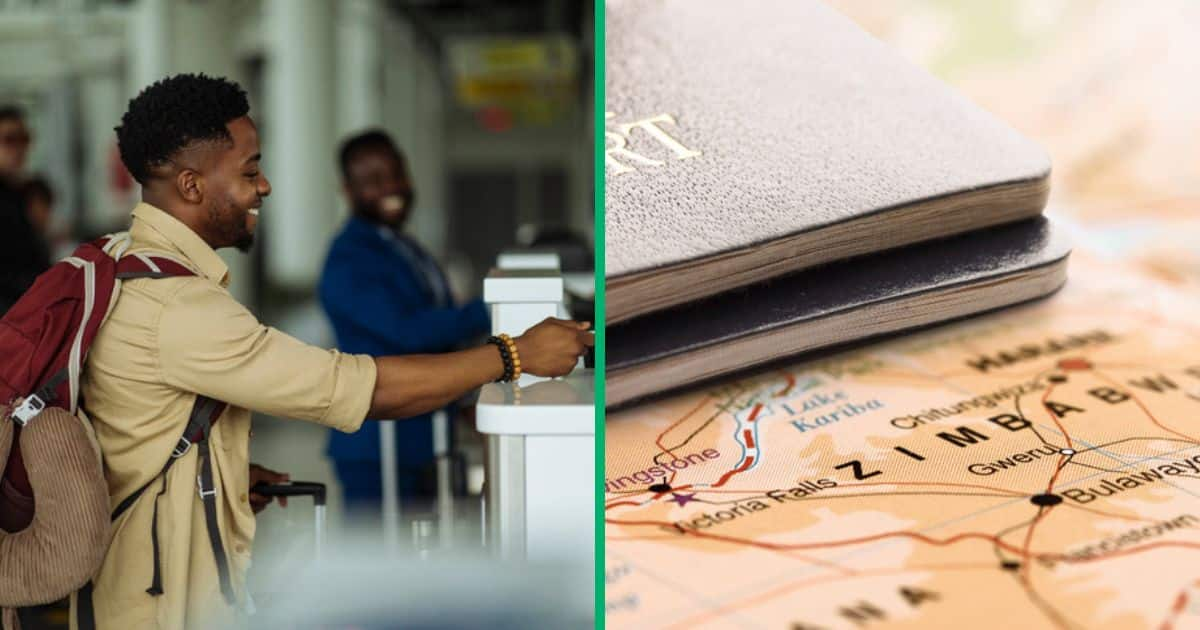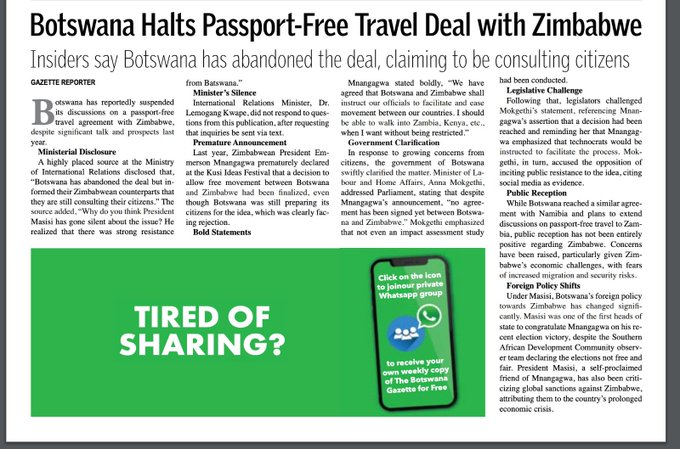
Botswana Suspends Talks on Passport-Free Travel with ZimbabweBotswana Suspends Talks on Passport-Free Travel with Zimbabwe Botswana has suspended negotiations on a passport-free travel agreement with Zimbabwe, despite promising discussions last year. The decision has sparked concerns among lawmakers who oppose the proposal. MPs’ Opposition Botswana’s Members of Parliament (MPs) have been outspoken against the plan to eliminate passports at border crossings between Botswana and Zimbabwe. They argue that it could worsen existing issues with the influx of Zimbabweans into Botswana, particularly in border regions like Francistown. Health and Economic Concerns MPs expressed concerns about the strain on Botswana’s healthcare system, which they claim is already overwhelmed by Zimbabwean visitors. They also raised worries about illegal gold mining and the potential disruption to Botswana’s economy. Namibia Agreement as Precedent Botswana currently has a similar passport-free travel agreement with Namibia. However, the Namibia scheme has not faced the same level of opposition as the proposed Zimbabwe deal. Presidential Agreement Last week, Zimbabwean President Emerson Mnangagwa announced an agreement with Botswana’s President Mokgweetsi Masisi to abolish the use of passports at border crossings. However, public backlash forced Minister of Labour and Home Affairs Annah Mokgethi to clarify that no such agreement had been formally implemented. Lack of Consultation Opposition leader Dithapelo Keorapetse criticized the government for announcing the deal without prior consultation. He questioned the authority under which President Masisi reached the agreement and expressed concerns about the potential consequences. Preference for Other Countries Some MPs suggested that Botswana should prioritize negotiating passport-free travel agreements with other countries, such as South Africa or Zambia, before considering Zimbabwe. Prohibitive Passport Costs The cost of obtaining a passport in Zimbabwe has been cited as a factor driving some people to illegally cross the border. However, MPs argued that the use of machine-readable identity cards would not significantly reduce the burden compared to passports. The suspension of talks on the passport-free travel agreement with Zimbabwe highlights the challenges and concerns surrounding such arrangements. While the proposal may have seemed promising initially, it has encountered significant resistance and requires further consideration and consultation to ensure the interests of both countries are protected.
Botswana has reportedly suspended talks on a passport-free travel agreement with Zimbabwe despite significant discussions and prospects last year, according to the Botswana Gazette.
Botswana MPs have spoken out against a proposal to abolish passports for travel between their country and Zimbabwe.

In response to a statement by Minister of Labour and Home Affairs Annah Mokgethi in the National Assembly, MPs from both parties criticised the proposed arrangement, which would see citizens of both countries using national identity cards instead of passports at border crossings.
Botswana already has a similar agreement with Namibia and now wants to conclude a similar agreement with Zimbabwe.
But while the Namibia scheme, which came into effect in February, faced no opposition, lawmakers told Minister Mokgethi they disagreed with the government’s move towards Zimbabwe.
Last week, Zimbabwean President Emerson Mnangagwa announced during his stay in Gaborone that he had reached an agreement with his Botswana counterpart Mokgweetsi Masisi to abolish the use of passports at border crossings.
But public outrage forced Mokgethi to read a statement in parliament saying the agreement was not yet in force.
It said in part: “…I want to make this statement to make it clear and set the record straight: there is no signed agreement to carry out this initiative.
“Given this background, the Batswana are assured that the fact that a concept is appreciated by the two leaders does not mean that the people of the two countries can now use their identity cards to enter their countries.
“There are processes and procedures that must be implemented to ensure and qualify the validity of all necessary requirements for travel, locally, regionally and internationally, before implantation can take place.
“The most important thing is that when adopting the regulatory standards, the two countries enter into an agreement with clauses such as cancellation or withdrawal in case concerns about violations arise during implementation.”
Opposition leader Dithapelo Keorapetse said it was surprising that the deal was announced without prior consultation.
“We don’t know who President Masisi represented when he reached this agreement with Mnangagwa or the government of Zimbabwe,” he said.
Francistown MP Wynter Mmolotsi said it would not be ideal to proceed with the scheme as the country, particularly areas closer to the border, were already bearing the brunt of the influx of Zimbabweans.
“The health system in Francistown is already overloaded with Zimbabweans. Some come here to mine gold illegally. If we open, without knowing it, we will have more Zimbabweans than the entire population of Francistown,” he said.
Some MPs, such as Unity Douw, wondered how the use of machine-readable identity cards would become less cumbersome than the use of passports.
The cost of obtaining a passport in Zimbabwe is prohibitive and some people are forced to skip the border due to limited job opportunities in their home country.
Some MPs said they would prefer to see other countries, such as South Africa and Zambia, negotiate a passport-free travel scheme before Zimbabwe.
VOA, Zwnieuws